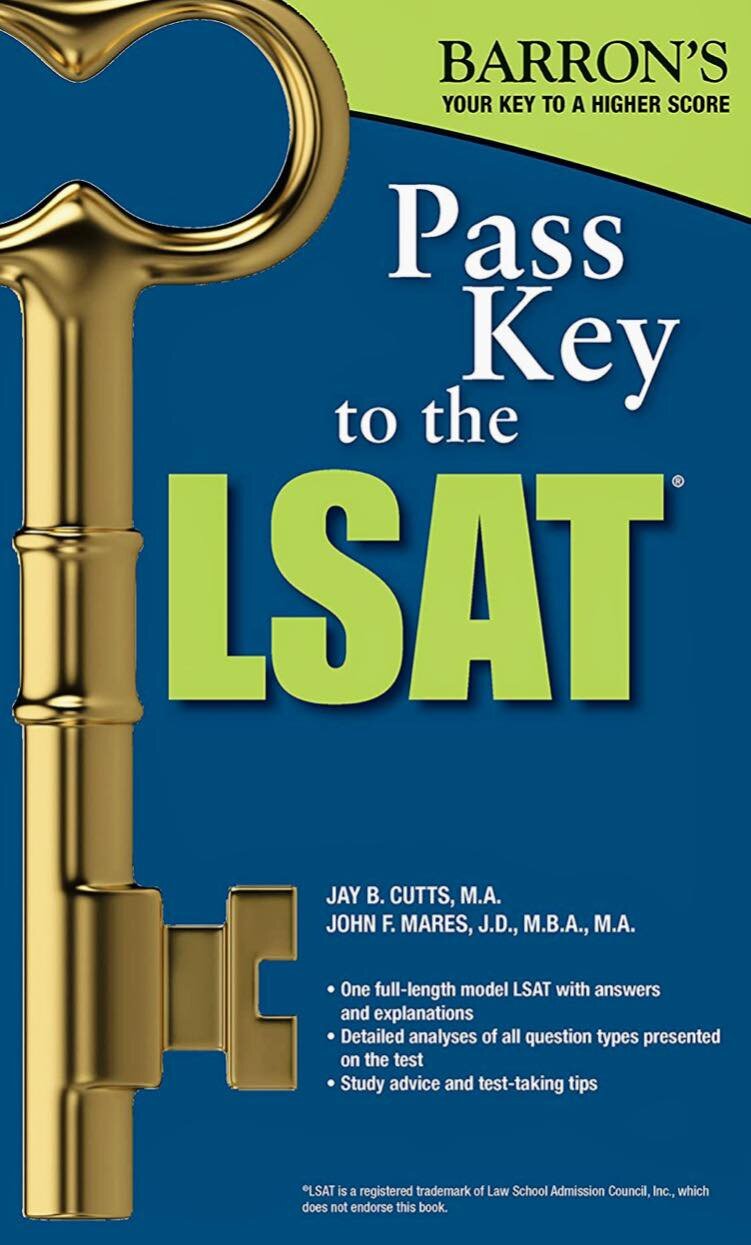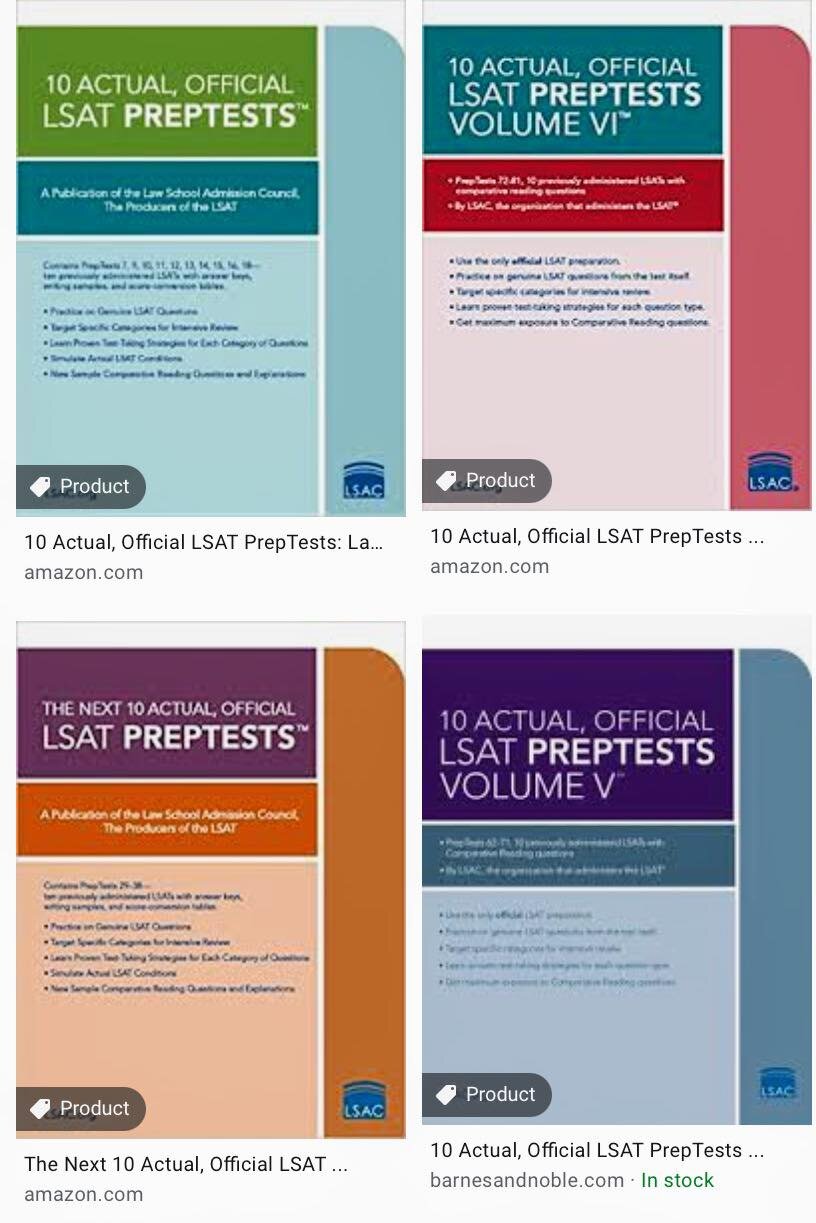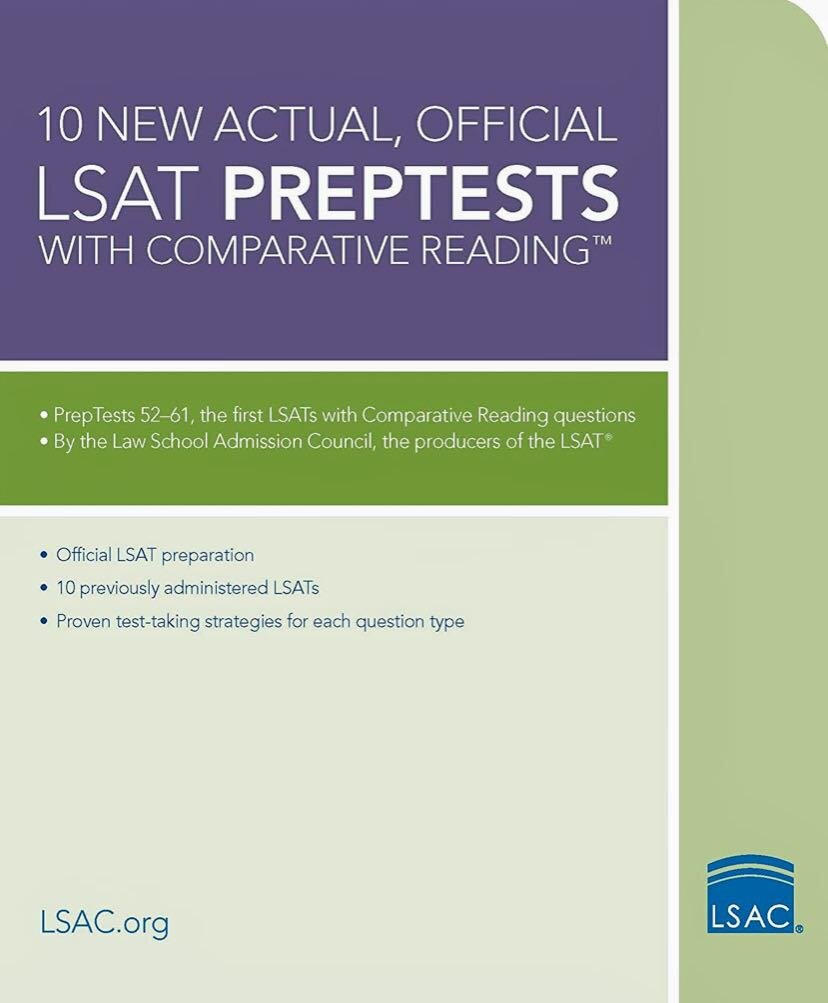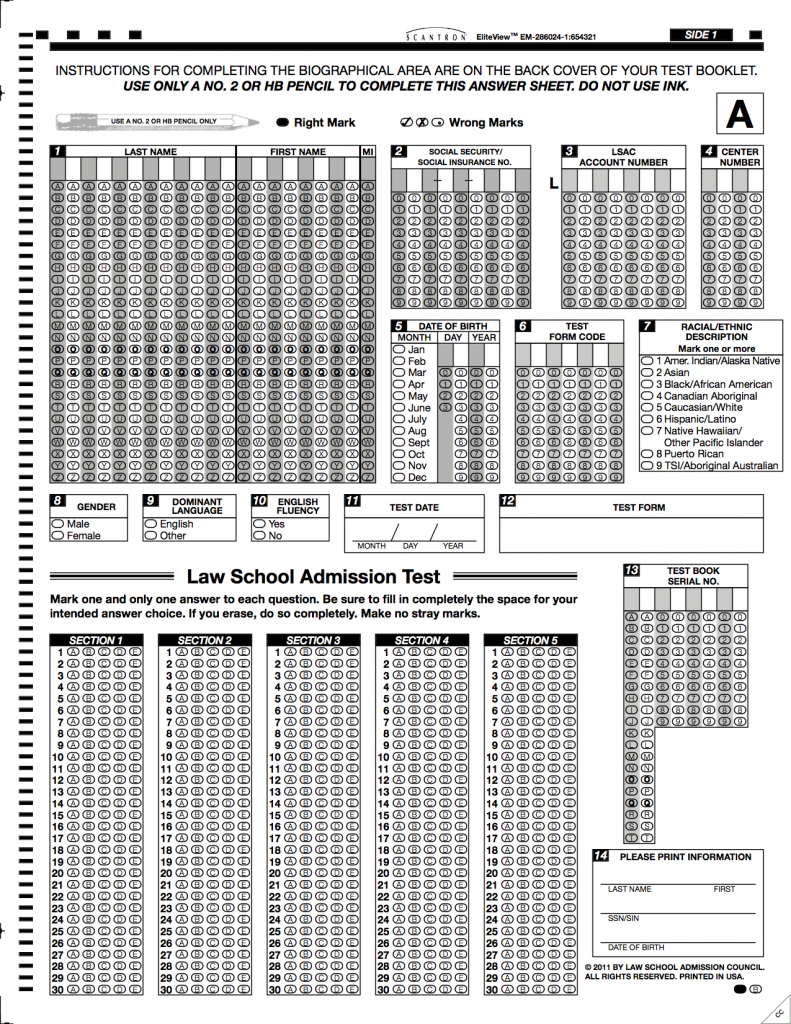Studying for the LSAT
No, you don’t have to skip Greek Week to study for the LSAT…
…but that might explain how Elle Woods’ score jumped from a 143 to a 179.
When I talk to prospective students about law school applications, their #1 concern is usually the LSAT. They want to know when to take it, how to study, what score is “good enough,” and how many times they should try. All very good questions - and I never know exactly how to answer.
I took my LSAT back in June of 2018, and - bless ALL the standardized test gods - only had to do it once. This was good because LSAT prep is mentally exhausting, time-consuming, and often discouraging - I don’t think I could have kept it up!
Nonetheless, prospective law students have to suffer through; LSATs are still happening during COVID (the next test is October 3!) but they’re currently shorter than the usual version and completely online. Law school applications have also recently opened or will open soon, so the score is still very important! In this post, I plan to do a quick intro to the LSAT, break it down by sections, and then give my two cents on how to prepare. Hopefully it helps someone out there, or just demystifies a critical step in how a law student becomes a law student!
WHAT IS THE LSAT?
The Law School Admission Test is a six-part* multiple choice exam, required by most law schools when submitting an application package. The LSAT is scored between a 120 and 180, and curved based on everyone else who took that same test. It’s so difficult that you can sometimes get one or two questions wrong, and still get a perfect 180. Nuts.
*Right now, the LSAT is administered a bit differently because of COVID - I believe it’s only three sections long and administered online, from the takers’ home.
The LSAT is broken into six sections, 35 minutes and roughly 20-28 questions per section (except the writing section, which is just one prompt). It contains the following categories:
Reading Comprehension - 1 section, commonly called “Reading Comp.” This is like the reading section on a high school ACT, but on actual steroids. Here, you can either speed read 3-5 paragraphs of dense text, four times, and risk misunderstanding the whole concept, OR think things through & don't answer half the questions.
Logical Reasoning - 2 sections, usually referred to as simply “LR.” Each question is a new scenario and you have to identify what logic applies in each one. AKA, “How did i just get TEN questions in a row WRONG while feeling TOTALLY confident about them?!”
Analytical Reasoning - 1 section, more commonly called “Logic Games.” Remember those word puzzles we used to do in math class, the ones that said "8 students are sitting in a line; two are wearing red shirts, one is wearing yellow, one is wearing green and the rest are in blue; no blue students are next to a yellow student; and the red shirts must be next to the blues - what order are they sitting in?”
Yea, those are logic games. Only the LSAT games are crazy complex and you have to get through 4-5 different scenarios to complete the section. Also, don’t try to solve the t-shirt puzzle - I just made it up.
Experimental Section - This is the final 35-minute section, but it’s not a “new” category; it’s simply another section of RC, LR, or AR. However, it can pop up anywhere in the test and you DON’T know which section is the experimental, and which ones are real. This is done so students take the experiment as seriously as the scored sections, but it always generates a lot of buzz post-test about which section was the experiment. As if we needed something more to worry about…
Writing Section - This is the final part of the LSAT, and is also 35 minutes long. It’s just a brief response to a prompt and fairly easy to prepare for, but many people blow it off because it doesn’t factor into their overall score. Still - some schools DO read them!
The LSAT is administered several times a year at multiple stateside and international locations. I got very lucky and tested in the town outside my Air Force base, but friends of mine had to drive 2-4 hours to get to their testing center. One guy, currently stationed in Bucharest, had to fly to Germany to take his LSAT.
Woof.
STUDYING FOR THE LSAT
“How should I study?” is the hardest question to answer, because I know how I studied - and I know it worked for me. But that does NOT mean it will work for anyone else! Like anything academic, LSAT prep is totally dependent on your own strengths, weaknesses, timelines, dedication, and goals. For example, I hate cramming for things, so I began studying much earlier than most people. I also didn’t want to spend big money on tutors or programs, so I spent “small” money - still way too much, IMO - to buy LSAT practice books (I go into detail about which books under “Study Timeline.”)
Therefore, my first piece of advice for LSAT prep is - FIND OUT WHAT WORKS FOR YOU, AND STICK WITH IT. If something that “everyone else is doing” doesn’t work, DON’T DO IT! (Now that I’m reflecting, this might just be good life advice in general…) Here’s what I mean - when I studied, the LSAT books all recommended timing yourself on every single question. The goal was to spend less than two minutes on each question, and track which ones take you the longest.
Oooookay. I tried this once, and quickly realized that resetting my watch so often was EXTREMELY stressful. So I stopped doing it! Instead I learned to pace by setting my watch to 35 minutes at the beginning of each section, and glancing at it every few questions. This allowed me to internalize how long each question took, and get into a rhythm for the section as a whole.
Other general LSAT practice advice…
Start studying earlier than you think you should. You can always scale back on time spent, but panic induced by lack of preparation is NOT a good time.
Also, start early in case your initial study techniques don’t work and you need to switch gears!
Hone in on your weaknesses and work hard to fix them. No point spending time on stuff you get mostly right! Do your best to “even out” your proficiency in each section - for example, logic games were hardest for me in the beginning, but dedicating extra time to them quickly brought the games ‘up to speed’ with the other sections.
TIMING. IS. KEY. Take some real, full tests! Getting a feel for pacing and building up your stamina is ESSENTIAL, and that’s why the Law School Admissions Council (LSAC) publishes old versions of the LSAT. Use them!
In that same vein, shake up your study environment. Don’t get too comfy in Your Seat in That Corner of the library, because that’s not where you’ll take the test! If you can handle different environments with varying noise levels, you’ll have no problem with the coughing proctor on test day.
Triple check the test rules & study accordingly. I wore an analog wrist watch for EVERY practice test, only to find out that I couldn’t wear it on test day. The proctors allowed me to keep the watch on my desk, so all was not lost - but I certainly would have studied that way had I known!
Finally, check out your local thrift store, Amazon used books, and thriftbooks.com before heading to the LSAT section of Barnes & Noble. This didn’t even occur to me, and I (literally) paid the price for it.
In my opinion, the general key to LSAT success is balancing a ton of study time with effective improvement techniques - which totally depend on your learning style and personal strengths/weaknesses. It’s not impossible to improve, but definitely takes dedication!
STUDY TIMELINE*
*THIS IS NOT THE GOSPEL TRUTH, this is just how I did it! But in case it’s helpful for anyone, here's a breakdown of my own study timeline & materials:
Dec 2017: Familiarized myself with the different sections of reading comp, logical reasoning, and analytical reasoning; read tons of online resources on how to study, and tried to figure out what techniques would work best for me. For reference, I began by reading Barron’s Pass Key to the LSAT, which features a full-length model LSAT; detailed descriptions of each question type; and extensive study advice.
Jan 2018: Worked slowly through practice questions without timing myself - started to recognize patterns and which questions/sections were hard for me. For reference, I used 3-4 different versions of the “LSAT PrepTest” books, which feature full-length, past LSATs with answer keys. This was my main study material from Jan to Jun, but when I got really confused on a certain type of question, I YouTubed!
Feb 2018: Began timing myself on single sections (35 minutes straight) using old LSAT practice tests, then checking my own answers and spending time on the ones I got consistently wrong.
Mar 2018: Timed myself on back-to-back sections, then three straight sections, to build up stamina; continued IDing which sections/types of questions I struggled with and gave those extra attention.
Apr 2018: Began taking full tests once or twice a week (four-five sections in a row...it was exhausting, and extremely discouraging at first). Took single sections on “non-full test” days, and tried not to go more than 1-2 days without looking at LSAT material.
May 2018: Continued to take full tests to build stamina, and honed in on the exact question types I STILL got wrong. This was definitely the “pinnacle” of studying - by this time, I felt completely comfortable with timing on each section.
June 2018: Tapered off!! I studied lightly, but mostly concentrated on mentally/physically preparing for test day.
TEST & DAY-OF RECOMMENDATIONS
I think people underestimate how stressed they’ll be on test day, so these are a few things to keep in mind before the exam:
Scope out the test center ahead of time, if possible - make sure you know exactly where to park, where to report, and what to bring with you. The LSAC is very specific about what you can and can’t have.
In the same vein, make sure you prepare your clear “test bag” the day before the exam. That should have your ID, registration form, pencils, snacks, etc. in it - don’t scramble to get this together right before you leave.
If you can, study at the same time you’ll take the LSAT. On test day your brain will recognize that it should be in “study/concentration” mode, and you’ll be able to slide right into the rhythm of test taking.
Don’t over-study in the week leading up to the test. Let your brain rest, and on the day before/morning, do a few practice problems from each section at MOST.
Finally, exercise before the test! Get your blood flowing, even if you just go for a short run beforehand.
Finally, a few exam-specific things to remember while actually taking the test:
Each LSAT section gets progressively harder (especially with logic games - the first question on each problem set is always a softball.) However, each question is weighted equally, so make sure you nail the easier questions before wasting time on the harder ones.
ALWAYS guess at the end of each section - don’t turn in your scantron with bubbles left blank!! A blank answer is a wrong answer, but a filled bubble has a 20% chance of being correct. Just one or two correctly-guessed questions can have a huge impact on your score, so take those last 30 seconds to bubble all missing answers.
Finally, DON'T EXPECT A MIRACLE! Real world, Elle Wood's jump from a 143 to a 179 in two months is not realistic. But the more prep you do, the better chance you have at dramatic improvement.
My co-workers helped me study (seriously!) and got me a cake when I received my score!
The LSAT is truly a beast, and I commend anyone who’s given (or giving!) it a shot. If you have any questions, feel free to shoot me an email - otherwise, just send some good vibes to the universe for all those test takers on October 3!






